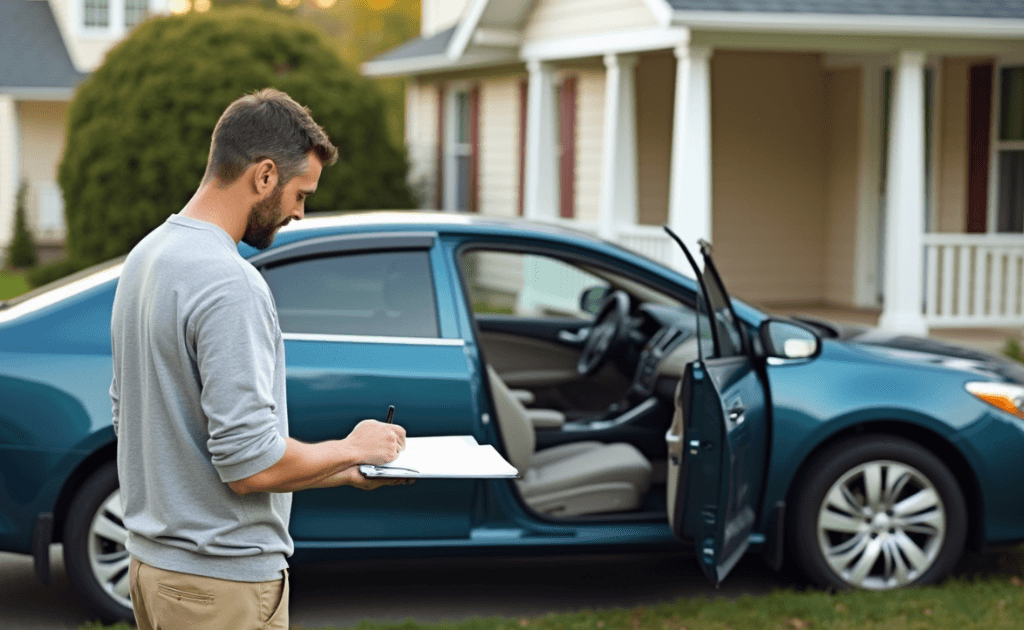Is Landlord Traveling to Properties Business Use Car Insurance?
The Hidden Pitfall Landlords Need to Address
Imagine you’re preparing for another busy day of property management—heading to inspect your latest acquisition, meet with contractors, or resolve tenant issues. You’re in your car, on the road, and deep in the rhythm of managing your properties. But as you drive, a thought crosses your mind: What happens if you’re involved in an accident during one of these trips?
As a landlord, you likely already juggle a number of tasks, from handling leases to dealing with maintenance requests. But one aspect you may not have considered in full detail is whether your car insurance covers your business use when you’re traveling to properties. A car accident could be a nightmare, but even worse—imagine discovering your personal insurance doesn’t cover such activities.
This article will walk you through everything you need to know about business use car insurance as a landlord. By the end, you’ll have a clear understanding of how your travel for property management purposes can affect your car insurance, and what steps you need to take to ensure you’re fully covered.
What Is Business Use Car Insurance and Do Landlords Need It?
What Is Business Use Car Insurance?
When it comes to car insurance, there are generally two types: personal and business use. Personal car insurance covers you when you’re using your vehicle for non-work-related purposes, like commuting to your regular job or running errands. However, when your car is used for business purposes, things change.
Business use car insurance is a policy that covers you when you’re driving for business-related activities. This could involve anything from traveling to properties you own, meeting with contractors, or performing any other tasks related to property management.
So, what makes this different from your standard personal policy? The primary distinction is in the extent of coverage. Personal insurance typically doesn’t cover situations where you’re using your car as part of your job. For landlords, that could mean issues if you’re driving to one of your rental properties and you’re involved in an accident.
Why Should Landlords Consider Business Use Insurance?
If you’re regularly traveling to properties, dealing with tenants, or managing repairs, there’s a good chance that your insurance policy won’t fully cover you. While a personal policy might cover casual driving, it probably won’t extend to your business-related trips, which leaves you exposed to financial risk.
Without proper business use car insurance, an accident that occurs during your travels could result in costly repairs or medical bills, and even legal fees, should you be held responsible for damages. Moreover, if your personal insurance doesn’t cover business trips, you may have to pay for everything out of pocket.
Do Landlords Need Business Use Car Insurance?
If your travel to properties is frequent, you may want to strongly consider upgrading your insurance to include business use. For landlords who spend time traveling between properties, inspecting repairs, or attending meetings with contractors, business insurance can provide much-needed peace of mind.
For those who have only one or two properties and don’t drive to them often, a simple change to your personal insurance may suffice. But if you’re running a larger portfolio or have employees who use your vehicle, then it’s wise to look into a commercial car insurance policy.
How Does Traveling to Properties Impact Your Car Insurance?

Personal vs. Business Use Insurance: What’s the Difference?
Your personal car insurance policy covers accidents and damages that happen during everyday activities. However, when your driving involves business use—like managing rental properties—the situation changes. Your personal insurance may not cover damages or liabilities that arise when you’re driving for work.
For example, if you’re driving to a property to meet with tenants or contractors and you’re involved in a collision, your personal insurance might refuse to cover the damage because the car was being used for business purposes. This is why it’s crucial to know when your personal insurance stops being sufficient.
The potential dangers of failing to update your car insurance.
If you don’t update your policy and you’re caught in an accident while managing your rental properties, there are several risks involved:
- Denied claims: If the insurer determines that your driving was for business purposes, they may reject your claim.
- Out-of-pocket expenses: Without the appropriate coverage, you may be left with costly repairs, medical bills, or legal fees.
- Higher premiums: If your insurer identifies that you’ve been using your car for business and you didn’t update your policy, they could increase your premiums, and in some cases, cancel your policy.
So, if your car is primarily used for property-related business, upgrading to business use insurance isn’t just a smart decision—it’s a necessary one.
How to Determine If You Need Business Use Car Insurance
How Often Do You Travel for Property Management?
The frequency of your property visits is an important factor in deciding whether you need business use car insurance. If you’re frequently visiting properties, meeting with tenants, contractors, or managing repairs, you’re essentially using your vehicle as a business tool. In this case, business use insurance would provide more comprehensive coverage.
For instance, if you only visit a property once or twice a month, personal car insurance might suffice with an occasional policy update. However, if you’re managing several properties or have tenants who require frequent maintenance, you might want to explore a business insurance upgrade.
What Type of Tasks Do You Perform While Traveling?
The types of activities you engage in while traveling to properties also matter. If you’re simply driving to inspect properties or drop off paperwork, your need for business insurance might be less pressing. However, if you’re meeting tenants, contractors, or supervising extensive repairs, this constitutes business-related activity, and it’s best to protect yourself with the proper insurance.
For landlords who own multiple rental properties, handling property management tasks can quickly escalate into significant business use of your vehicle. From overseeing renovations to coordinating with tenants or running errands, these activities increase the risk of something going wrong during your travels. It’s best to ensure that your insurance matches your activities.
What Are the Different Types of Business Use Car Insurance for Landlords?

1. Standard Business Use Insurance
If your property management duties require regular visits to your properties or meetings with tenants and contractors, standard business use insurance is often a good fit. This type of coverage generally extends to routine business travel, including property inspections, repairs, and other related tasks.
Standard business use insurance typically covers:
- Travel to and from properties
- Meeting tenants and contractors
- Property inspections
2. Commercial Car Insurance
For landlords managing large portfolios or multiple properties, commercial car insurance is a more comprehensive option. This policy offers a broader scope of coverage, including:
- Transportation of goods or materials to properties
- Occasional passenger transport (e.g., if you’re transporting contractors or employees)
- Larger vehicles that are used for more intensive property management tasks (like moving supplies)
Commercial car insurance is ideal if your property management activities are substantial and involve more than just regular inspections or tenant meetings.
3. Occasional Business Use Insurance
If you only occasionally use your car for property management—say, for routine inspections or meetings—occasional business use insurance might be sufficient. This policy covers lighter business-related driving without the higher premiums of a full commercial policy.
It’s important to note that this type of insurance still requires you to declare the business use, and if your property management activities increase, you may need to switch to a more comprehensive plan.
How to Update Your Car Insurance to Cover Business Travel
Step 1: Contact Your Insurance Provider
The first step in updating your car insurance is to talk to your insurance provider. Inform them that you require coverage for business use. Be prepared to explain how often you travel for property management tasks and what types of activities you engage in.
Step 2: Discuss the Coverage Options
Your provider may offer a few options based on your needs. Depending on the frequency and nature of your travels, you could choose between:
- Adding business use coverage to your personal policy
- Switching to a commercial car insurance policy
It’s important to get clarity on what each option covers, so ask about any potential exclusions or limitations.
Step 3: Compare Costs
Expect some increase in your premiums when upgrading to business use coverage. The cost will depend on the extent of your business use and the type of policy you choose. Standard business insurance may increase your premium by around $200–$400 annually, while a commercial policy could be much more.
When assessing the cost, also consider potential financial consequences of being uninsured during business travel—this could far outweigh the insurance expense.
FAQ: Is Landlord Traveling to Properties Business Use Car Insurance?
1. Is landlord traveling to properties considered business use for car insurance?
Yes, if you’re using your vehicle for property management tasks such as meeting tenants, managing repairs, or conducting inspections, it’s considered business use.
2. Do I need a separate car insurance policy for business?
Not necessarily. You can add a business use rider to your existing policy, but for extensive property management activities, you might need a full commercial policy.
3. What happens if I don’t have business car insurance as a landlord?
If you don’t have business use coverage, you risk being denied coverage if you’re involved in an accident while traveling for property management. You could face significant financial loss.
4. How much does business use car insurance cost for landlords?
The cost depends on the level of coverage, but generally, adding business use coverage to your policy can cost between $200 and $400 annually. Commercial car insurance is more expensive and could range from $500 to $1,000.
Conclusion: Safeguard Your Property Management Business
As a landlord, your car is more than just a means of getting from point A to point B—it’s an essential tool for managing your properties and business. Ensuring that your car insurance covers business use will protect you from potential risks and liabilities that come with your responsibilities.
By understanding the need for business use car insurance, evaluating your travel habits, and selecting the appropriate coverage, you’ll ensure that your properties—and your wallet—are safe. Don’t wait for an accident to force you into action. Take the time to review and update your car insurance today, so you can drive confidently tomorrow.






